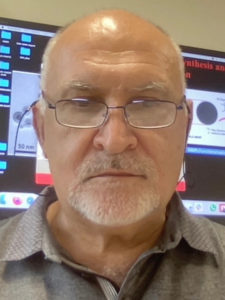A Ferromagnetic Glass State observed in thin cobalt films hybridised with molecular layers: collapse of the standard magnetic domain structure
Place : IRIG/SPINTEC, auditorium 445 CEA Building 10.05 (access to CEA requires an entry authorization. Request it before 18th at admin.spintec@cea.fr)
video conference : https://univ-grenoble-alpes-fr.zoom.us/j/98769867024?pwd=dXNnT3RMeThjYStybGVQSUN0TVdJdz09
Meeting ID: 987 6986 7024 Passcode: 025918
Abstract : Interfacing the thin films of 3d ferromagnetic metals (FM) with molecular layers induces strong modifications of key and device-relevant magnetic parameters, such as magnetic anisotropy, magnetization etc. This is due to the hybridization of the surface FM d orbitals with the p molecular orbitals, resulting in modifications of the effective Spin-Orbit Coupling and Magneto-Cristalline Anisotropy (MCA).
I will present theoretical and experimental evidences that the effects induced by the interfacial hybridization are not only quantitative and cause the collapse of the standard magnetic domain structure, promoting instead the establishment of a new Ferromagnetic-Glass State (FGS).
The experimental part will describe polycrystalline Co films hybridized with fullerenes (C60) and Gallium-quinoline (Gaq3) molecules, all investigated by MOKE, AMR, SQUID and MFM measurements. A significant in-plane magnetic hardening of the cobalt layer will be reported, showing a factor 2 enhancement of the coercivity at room temperature and a colossal enhancement at low temperatures with respect to bare cobalt films. Minor loops characterization by MOKE and SQUID revealed an unusual magnetization dynamics significantly deviating from the Rayleigh law, the latter based on domain wall nucleation and motion.
On the theoretical side I will present DFT calculations and a new correlated random anisotropy phenomenological model, able to account for for detected hardening and for the violation of the Rayleigh law.
Biography : V. Alek DEDIU is leader of the Molecular Spintronics and Magnetism group at the Institute of Nanostructured Materials, Italian National Council of Research. He graduated in experimental physics in 1982 at the Moscow Physical-Engineering University and accomplished his Ph.D. on superconductivity in 1989 at Lebedev Institute in Moscow.
Alek Dediu pioneered in early 2000 the first experimental evidences on molecular spintronics, moved to the development on organic based spintronic memristors, and in the 2010-2015 period contributed to the development of the spinterface concept, the most advanced achievement of the molecular spintronics.
He is also actively promoting various magnetic solutions for bio-medical applications, among which he pioneered the idea of magnetic scaffolds for tissue engineering (project MAGISTER) and that of an innovative magnetic lab on chip for ultrasensitive bio-diagnostics (project MADIA).
His main research interests are: molecular spintronics, interface physics and quantum engineering, memristive properties and neuromorphic computing, nanomagnetism for medical applications and others.
Actively participated in EU Framework Programs and coordinated five projects: FP6-OFSPIN, FP7-HINTS, FP7-MAGISTER, H2020-MADIA, H2020-INTERFAST (in progress). He is chair of ICM2024 conference in Bologna this year (June 30 – July 5)

